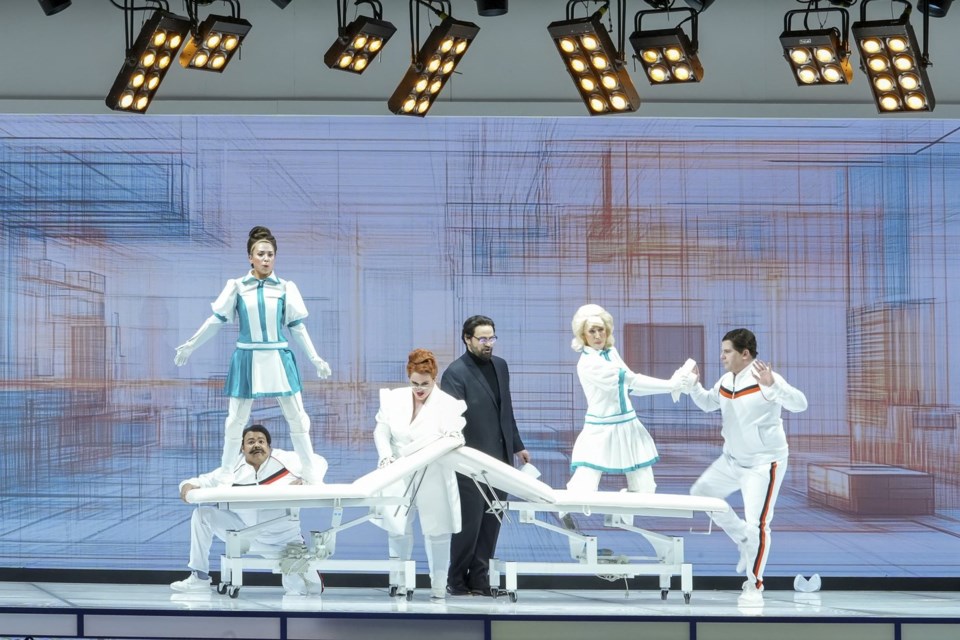DETROIT (AP) — Audiences at the Detroit Opera House expecting their performance of “Cosi fan tutte" to begin with the overture may be surprised to hear instead a product launch from a tech company CEO.
It’s Mozart meets Artificial Intelligence, in the latest mind-bending production by Yuval Sharon, the company’s adventurous artistic director.
The opera, first performed in 1790, was the last of three collaborations between Mozart and librettist Lorenzo Da Ponte, and despite its sublime music it has proved the least popular.
That’s due In part to the work’s uneasy mix of light-hearted farce and the cynical worldview it seems to endorse. Even the title, which translates as “Women are Like That,” suggests a misogyny that is openly expressed by one of its main characters, Don Alfonso.
But Sharon rejects the idea that the opera itself is meant to demean women. “It’s going too far to call Mozart a feminist,” he said. “But when I listen to the music, it seems to me he doesn’t want us to agree with Don Alfonso. He and Da Ponte can’t possibly want us to take half the population of humanity and constantly denigrate it.”
Instead, Sharon believes, the collaborators are “representing a character and perspective that might actually not be the perspective we’re meant to sympathize with.”
In the opera, Don Alfonso, a jaded philosopher, bets two young friends that, given the opportunity, their girlfriends, Fiordiligi and Dorabella, will prove unfaithful. The men switch identities, adopt disguises, and each pursues his friend’s sweetheart. Eventually both women succumb to their new suitors.
Don Alfonso as AI entrepreneur
Sharon’s production turns Alfonso into the head of an AI company called SoulSync. Under his guidance the younger men have created two female automatons (Alfonso doesn’t like the term robots) designed to be “perfect companions.”
This concept of Alfonso as a soulless tech guru may sound far-fetched, but Sharon insists it’s not so far from the truth.
“He’s actually a replica of what we see in the tech industry,” Sharon said. “There’s a messianic belief that we must transcend our own humanity and that AI is making up for all the terrible ways we behave. People really do believe that the future of humanity is robotic.”
Thomas Lehman, a baritone who is singing the role of one of the lovers, Guglielmo, in his fourth production of the work, thinks Sharon is “taking the story and turning it upside down in the right ways.
“The original libretto leans heavily toward the men,” he said. “Yuval has found a way to give the women the strength they deserve, to make it a level playing field.”
Mezzo-soprano Emily Fons, who is portraying Dorabella for the third time, sees the updating as part of a broader movement of “trying to figure out how to take pieces that are old and do something new.”
The automatons may be programmed to act a certain way, but “we’re all programmed to some extent,” she said. “What speaks to me is how they learn to feel things and take those feelings to have a say in what happens next.”
Sharon said that’s exactly what he’s aiming for. The women “start out incredibly mechanical and become much more human in a way,” he said. “As if we’re really watching their consciousness and their emotional life develop before our eyes.” The men, on the other hand, increasingly reveal their limitations and become less interesting as the opera progresses.
What up with the magnet?
The notion of humans as machines is actually embedded in the opera as Mozart and Da Ponte wrote it — something Sharon said he first realized while attending a performance years ago.
“I was watching a traditional production, very crinoline, hoop skirts, big dresses, lots of buffoonery. I was quite bored,” he recalled. “And then we get to the Act I finale and suddenly there’s this magnet. And I thought, what’s up with that?”
What was up was a medical treatment advanced by Franz Mesmer, an 18th century German physician who was a friend of Mozart and whose name has given rise to the term “mesmerism.”
He believed that the human body contained metals that could be realigned by moving a magnet over the skin. In the opera, a character named Despina poses as a physician and uses a magnet to “cure” the two suitors who have pretended to swallow poison.
Though the production, which opens April 5 for three performances, raises serious questions about the use of AI, Sharon has made sure to keep the tone light. And he’s built in some twists and turns of his own devising to take the audience by surprise.
That’s why the plot summary in the written program ends abruptly after Act 1. In place of the remainder of the story there’s just this note:
“The director has intentionally withheld a synopsis for Act II to avoid spoilers. Enjoy the drama as it unfolds.”
Mike Silverman, The Associated Press



